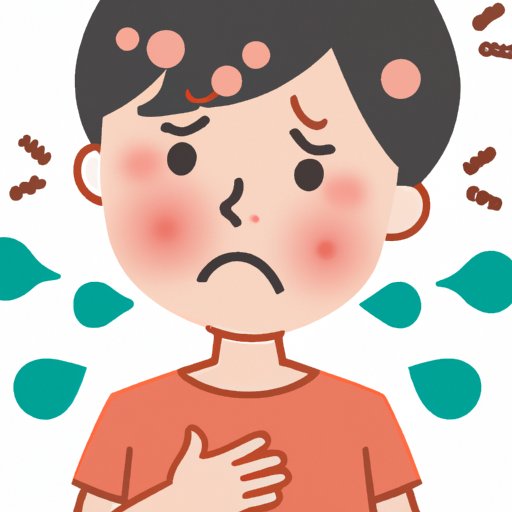
Introduction
Sweating is a natural function of the human body that helps regulate body temperature and eliminate toxins. However, for some individuals, sweating can lead to an allergic reaction, which can cause significant discomfort and impair daily life. This article will explore the phenomenon of sweat-induced allergies, how they impact people’s lives, and methods to manage the condition.
Sweat-Induced Allergies: Can Your Own Perspiration Really Be the Culprit?
Sweat allergies occur when the body’s immune system mistakes certain proteins found in perspiration as harmful and triggers an allergic reaction. Symptoms of sweat allergy include itching, hives, and redness at the affected site. The scientific reason behind this phenomenon is still not fully understood.
According to a study published in the Annals of Allergy, Asthma & Immunology, the prevalence of sweat allergies is relatively rare, affecting only 1% of the general population. Despite its low prevalence, sweat allergy can be a significant source of discomfort for people who have it.
When Your Sweat Betrays You: How Allergic Reactions to Perspiration Impact Daily Life
Living with a sweat allergy can be a frustrating and challenging experience. Daily tasks such as exercise, outdoor activities, and even social gatherings can be uncomfortable and often avoided altogether.
First-person accounts of people living with sweat allergies have reported feeling self-conscious about their condition, which can be exacerbated by visible symptoms such as welts and rashes or body odor caused by the reaction.
In addition, chronic sweating and the associated allergy can take a toll on mental health, leading to anxiety and depression. It is essential to address the psychological impact of sweating allergies and seek professional support when needed.
The Surprising Link Between Sweating and Allergies – What You Need to Know
Sweat allergies are often associated with other allergic reactions, such as allergies to certain foods, medications or environmental factors. According to further research, sweat allergies can sometimes be caused by an underlying medical condition such as atopic dermatitis or eczema, which makes the skin more reactive to environmental stressors like sweat.
A better understanding of the causes of sweat allergies can help determine the best approach to treatment. Research has shown that topical creams, antihistamines, and corticosteroids can help alleviate symptoms. However, other simple remedies can work as well, such as taking cool showers, avoiding the sun, and wearing breathable fabrics.
Sweat It Out: Managing Allergic Reactions to Your Own Perspiration
It is essential to take proactive steps to prevent and manage allergy-induced by sweating. These can include changes to daily routines, such as exercising in an indoor, air-conditioned environment, wearing loose clothing, and showering as soon as possible after sweating. Another solution that many people find helpful is using antiperspirants that cover the affected area.
For those who struggle with severe allergies, seeking the advice of an allergist can be crucial to finding more effective and personalized treatments. An allergist may recommend immunotherapy or other advanced therapies to manage the condition.
Breaking a Sweat: Common Misconceptions About Perspiration and Allergies
There are several misconceptions about sweat allergies that can further stigmatize people living with the condition. For example, some believe that sweat allergies can develop as a result of poor hygiene. However, sweat is a natural occurrence that cannot be prevented, no matter how much a person bathes.
It is essential to dispel these misconceptions and separate the myths from facts. Medical professionals specializing in allergies and immunology are the best sources of factual and medically accurate information.
Sweating the Small Stuff: How Environmental Factors Play a Role in Allergic Reactions
For those dealing with allergies caused by sweating, understanding environmental factors is crucial, as these can trigger sweat allergies further. Heat and humidity are two significant triggers, as exposure to these conditions can cause the body to release more sweat and trigger an allergic reaction.
In contrast, spending time indoors in a climate-controlled environment with good ventilation can help reduce the severity of sweat allergies. It’s crucial to stay hydrated throughout the day, avoid wearing tight clothes, and frequently changing any sweaty clothing.
From Rashes to Respiratory Problems: The Wide Range of Symptoms Caused by Sweat Allergies
Sweat allergies can manifest in different ways, making it essential to recognize each symptom type. The most common symptoms of sweat allergy are skin-related reactions such as rashes, hives, and itching. These reactions can occur anywhere on the body and may be accompanied by a burning or tingling sensation.
In some cases, sweat allergies can cause respiratory problems such as wheezing or difficulty breathing. These more severe symptoms may require emergency intervention and immediate aid.
Conclusion
Sweating is an important physiological process, and while rare, allergies caused by sweating can cause an array of uncomfortable symptoms. With proper management, sweat allergies can be mitigated, allowing those who have them to live a comfortable life comfortably. In case of any severe symptoms or discomfort, it is always essential to seek professional help and treatment.





